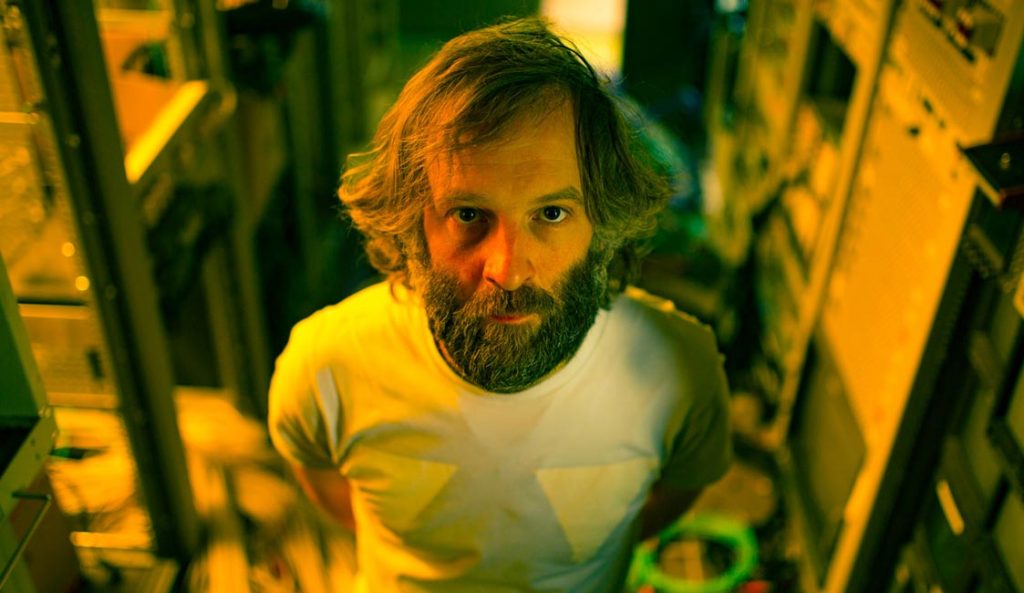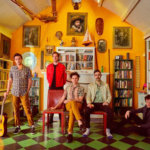3333 is the first of the incarnations of two years work in re-appropriated editing suites of the Old Granada TV studios in Manchester. The extensive studio space was the perfect ground for artist development. Unlike the previous two solo records, which saw help from a plethora of technicians and creative’s, this third is truly without assistance or aid in button pressing, plucking and hitting during the production process.
This is of course without mentioning Leonore and her dulcet tones that feature on three of the tracks, plus mastering from 80Hertz studios. This record caps off the DJ trilogy of albums, first conceived in 2003. At the end of a mammoth journey that documents the metamorphosis from solo writer, performer, into a drummer, producer and mixing engineer, Denis draws on a vast array of musical influences to evoke a sense of the growing friction between an ever-juxtaposed globalised world.
Looking into mythology, religious text, non-fiction and science fiction books for lyrical inspiration; the scene was set to write a modern dystopian sound track with all tracks intended to be 3 minutes and 33 second long songs. Sharing studio space with Manchester legends Graham Massey and Mr Scruff (Andrew Carthy) allowed for guidance and often-essential conversation through out the process. Both helped formulate the short list of tracks as well as loaning microphones, guitars, synths, organs and other musical necessities thus helping guide in completion of the album.
BIOGRAPHY
Denis Jones has been known to improvise entire songs live on stage, conjuring up a bewitching, genre-bending brew from a dozen electronic devices, drum pads, a detuned guitar and his own hypnotic vocals. Often, even Denis doesn’t know where his songs have sprung from or what his lyrics represent.
The visceral thrill of music made in a moment that can never be repeated has become the Manchester-based musician’s calling card. It has taken him on tour across the world, from a mountain-top monastery in Switzerland, Nuremberg’s Museum of Modern Art and Le Botanique in Brussels to Vietnam, Canada, the States, Poland and Portugal. It has earned him support slots with Johan Johnasson, Can’s Damo Suzuki and Mr Scruff (on whose most recent album he collaborated on five tracks), seen him warm up for Warpaint and Massive Attack in German venues and storm the stage at his dream venue, Liverpool’s Philharmonic Hall.
“The sense that anything can happen is what people find compelling,” says Denis, from his studio in the bowels of Manchester’s famous former Granada Studios, now a treasure trove of synths, instruments, banks of electronics and a monstrous mixing desk left when the TV company relocated to Salford. “They respond to the immediacy of the music, which is common with rock bands, but rare with electronic artists.
“By sampling and arranging on the spot, the crowd can feel the music being made. It’s a risky way to work. I’ve had songs fall flat on their face, but operating on the edge is what makes my gigs exciting. When the music takes over and the melody appears, it’s magical.”
The immersive, in-the-moment nature of the complex soundscapes Denis orchestrates has seen him sought out for film soundtracks and plays. He was the sonic star of Scuttlers, a major theatre production about street gangs staged at Manchester’s Royal Exchange for a month, which summoned the city’s industrial past, largely through Denis’ highly acclaimed live score.
The Guardian devoted the entire first paragraph of its glowing review of Scuttlers to Denis’s “sonic poetry of motion”, praising his ability to both mimic vast and varied machinery at work and provide nimble accompaniment to the action. For nine performances a week, from a suspended platform, Denis created a unique soundtrack that involved ‘playing’ the venue. Inspired by David Byrne’s Factory installation, he fitted 24 tiny hammers which hit the theatre’s frame and rafters to evoke not only the cacophonous sound of an industrial environment, but its actual, physical feel.
That spontaneous connection between sound and listener is key to all of Denis’s work and dates back to his childhood memories of music. From the age of three, he put on headphones and immersed himself in the prog-rock albums he picked from his parents’ record collection because he liked the look of their sleeves.
“It was my first taste of transcendence through music,” he recalls. “There are photos of me at three with those huge headphones on. I was already obsessed. I remember music putting me in a meditative state, a long time prior to me picking up any instrument.”
Brought up in Skelmersdale, west of Wigan – a 1960s new town Denis describes as “concrete in the middle of the countryside” – the youngster asked for a guitar aged six, got one at eight and has been self-taught ever since. Never learning theory has served him well. His distinctive guitar-playing style came from detuning the instrument and relying on his ears to decide what sounded right for the songs he started writing straight away and first played live, at school, at the age of 14. That show, at which he snuck in a cover of Radiohead’s Street Spirit (Fade Out), marked the start of a shape-shifting career that grew from playing folk in Liverpool pubs to embracing electronics in London, moving to Manchester via Sheffield and constantly changing tack as technology developed and his technique progressed.
In London in the early Noughties, Denis played acoustic gigs with pedals, cables and a glockenspiel and immersed himself in the glitch electronica scene, absorbing Four Tet’s first album and the Matthew Herbert classic Bodily Functions and learning how to sample live. As his gigs got bigger, so did his sonic haystack of equipment – synths, drum machines, effects boxes and a table full of mixers, most of which he managed to fit into an oversized flight case when he was invited to play his first gig abroad, in Lithuania.
A move to Manchester led to Denis releasing two critically lauded albums on indie label Humble Soul, notably 2010’s Red + Yellow =, which featured some of the city’s finest electronic musicians and was described by The Guardian as “scuzzy Mancunian blues at its richest and most intriguing”. A multi-tasker both on stage and off, Denis designed the artwork, as he has done in the past with the visuals for his live show.
“I’ve always been good at art and design,” he says. “And I’ve always been very physical. Both of those have fused with the music into one project. The physicality helps me live. I’m a big, powerful bloke with great co-ordination, hence the octopus nature of my set.”
Denis’s first soundtrack was for an award-winning student film. In 2014, he was commissioned to score the Maik Reichert documentary Ostkreuz, which followed an East Berlin-based photography company that had documented the fall of the Wall, which appeared on the Arte network in Germany and France, supported by the Goethe Institute worldwide. Denis has since composed for films featuring Martin Freeman, Jose Long and Julian Barrett.
During the lengthy prep for Scuttlers, his current studio became available – although it took months to move much of the old equipment left behind, in the last studio from which Granada broadcast. Some of it has been saved – including the desk, which was used on the 3333 album.
For the first time ever, Denis is recording songs that didn’t begin on www.
“I’m going the opposite way,” he explains. “Instead of taking songs I’ve improvised live and trying to hone and condense them for recording, I’m writing music I may never perform live. The songs will be shorter, more dynamic and technically better, with tighter arrangements and built with technology I’ve never used before, including a laptop. I’m looking forward to including key changes that weren’t possible when I was restricted to the hardware.”
He will also have time to work on the lyrics, so expect the self-confessed big mouth to have plenty to say.
“The vocals are always the last thing I add, but they are the main currency of my live set – or at least, what people talk about the most. From that first did I gig at school, I knew I had a voice because it got me conversations with the girls that I couldn’t make laugh. People tell me they hear elements of Peter Gabriel and Sting in my vocals, which I guess is an influence from my childhood. I was obsessed by Regatta De Blanc. That and the first side of Tarkus by Emerson, Lake and Palmer, which I still know off by heart.”
The urge to improvise hasn’t left him though;
“Some of the new songs will inevitably appear in my live set, albeit probably in bits that I borrow and build from,” he says. “And there is one song that began as an improvised piece. It’s called Don Benito, after a Spanish town in which I recently played a gig. I got an encore, which I improvised from scratch and went down a storm. Fortuitously, someone filmed it. I watched that, went back and unpicked the song, which has since become a completely new tune. What was the original inspired by? I have absolutely no idea.”








